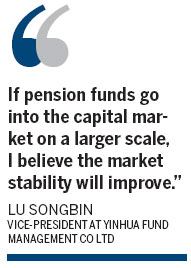Pension funds urged to invest in equities
Updated: 2011-12-21 09:30
By Gao Changxin and Diao Ying (China Daily)
|
|||||||||||
SHANGHAI/BEIJING - The nation's largely unmanaged pension funds should be invested in equities to achieve higher returns, Dai Xianglong, the head of China's $130 billion National Social Security Fund (NSSF), said on Tuesday.
But the chairman of the National Council for Social Security Fund, which manages and operates the fund, warned that equity investments should be long-term and value-oriented, as short-term speculation was too risky.
"Nearly all pension funds in the world invest in the stock market. I think it is OK to allocate part of the pension funds managed by local governments to buy stocks," said Dai at a forum in Beijing. "This will help preserve and increase the value of pension funds."
In China, little is done to manage the country's pension funds, which employees pay into. Once contributions have been made, basically nobody is responsible for ensuring that returns even exceed the rate of inflation, which has shot up in recent years. There are no central government agencies designated to invest the funds and few local governments bother.
A report released on Sunday by Wuhan University said that yields for pension funds were probably negative when adjusted for inflation.

Dai's view was supported by Guo Shuqing, the new chairman of the China Securities Regulatory Commission, the nation's top securities regulator.
In a speech on Sunday, Guo called on China's investment banks to design products that would help the funds invest in the securities market.
He said that investing the funds would be "beneficial to the country, the capital markets and every citizen".
By the end of 2010, only 31.8 billion ($5 billion) of the country's 1.6 trillion yuan in pension fund assets had been invested in securities, according to the Ministry of Human Resources and Social Security.
The rest mostly sat in banks, earning deposit rates that generally failed to keep up with inflation.
A report by the Chinese Academy of Social Sciences said the pension funds were yielding less than 2 percent a year.
In comparison, the NSSF, which is more actively managed, realized a 9.17 percent annual yield over the past decade, 6.77 percentage points above the average inflation rate, by investing in equities and corporate and government bonds.
The money in the fund mainly comes from share sales in State-owned companies and central government grants.
"Rules will come out soon on how to invest the pension funds, now that managers from the sell side and buy sides have both made clear their views," said Tian Yuan, an analyst with Bank of America Merrill Lynch.
Hua Jianmin, vice-chairman of the Standing Committee of the 11th National People's Congress, the top legislature, said the nation should give its pension funds priority in selecting investment opportunities to ensure the funds' safety
"Attention should be given to helping the pension funds retain their value. When we see good investment opportunities, we should first consider pension funds," he said.
Participation by pension funds would also improve the stock market's stability, experts say.
"If pension funds go into the capital market on a larger scale, I believe the market stability will improve," said Lu Songbin, vice-president at Yinhua Fund Management Co Ltd.
However, Feng Jin, a professor of labor economics at Fudan University in Shanghai, said that if the pension funds were to invest in equities, foreign markets should be considered first.
"The Chinese stock market, given its track record and reputation, is not a good place for pension funds. Foreign stock markets, where everybody plays by the rules, are safer," she said.
Related Stories
NSSF to be PICC 'sole investor' 2011-06-22 07:53
NSSF asks for nod to invest in foreign PE 2009-05-19 07:57
State banks may get help from NSSF 2010-04-12 13:38
Datang may sell 20% stake to NSSF 2009-07-09 08:00
- Li calls for green drive to improve economy
- Foreigners flock to China for job opportunities
- US court concludes tariffs on Chinese goods illegal
- Toy orders plunge in export-oriented city
- Japan mulling purchase of China govt debt
- Wen calls for confidence in economy
- Judicial decision to protect IPR
- Pension funds urged to invest in equities









